From the Honda Foundation (Chairman Hiroto Ishida)-sponsored lecture and discussion meeting "Challenging the mysteries of sleep: Wellness starting from healthy sleep" (April 16, 2025)
Thank you for gathering here today. Today I would like to talk about sleep (which is essential for our physical and mental health). WPI-IIIS, the organization I belong to, is the University of Tsukuba's research institute for sleep (the International Institute for Integrative Sleep Medicine), where about 240 people, including graduate students, conduct research. We are one of the world's largest research institutes specializing in basic research on sleep and take pride in playing a leading role (in this field). We have established the company "S'UIMIN" (which provides a sleep measurement service using a brainwave-measuring wearable device and AI-powered automatic analysis) as a university-launched venture.
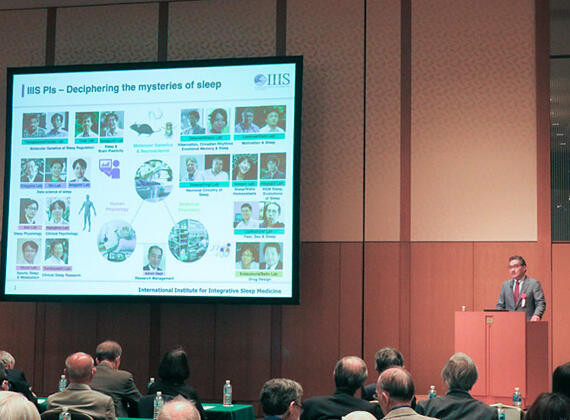
Fundamental behavior from before brain development
I think you know that all mammalian species, including us humans, sleep. Sleep was behaviorally defined around the year 2000, and it was found that among vertebrates, fish also sleep, and among invertebrates, insects and nematodes—species distant from us—also sleep. At that point, it seemed that all animals with brains sleep, but in 2017, a shocking paper came out showing that jellyfish also sleep.
Jellyfish have nerve cells throughout their bodies, forming networks, but they don't have brains. Sleep is a fundamental behavior (inherent in living organisms) from before brain development. It is known that all organisms with nervous systems sleep.
During sleep, consciousness is diminished, and we are in a state which is dulled toward the external world. There is no clear answer to the question of why such risky behavior has been continuously preserved. The brain is a biological computer, but it must undergo offline maintenance for a certain period. In fact, the brain's neurons are not resting during sleep. To use a computer analogy, it's in a state of offline maintenance.
It's obvious that the only way to get rid of sleepiness is to sleep, but the mechanism—what sleepiness actually is—is not well understood. However, in the case of mammals, we can divide sleep into three states: wakefulness, REM sleep, and non-REM sleep.
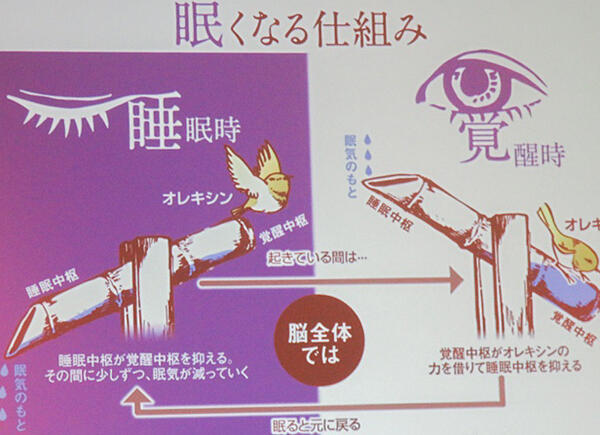
Provided by Yanagisawa
REM and Non-REM, repeating until morning
You've likely heard the term "REM sleep." "REM" is an abbreviation for "Rapid Eye Movement," and it's called this because the eyes move around under the eyelids. This movement is believed to occur when we're having vivid dreams—visual dreams—and the eyes move in accordance with the dream content.
REM sleep is, in a sense, paradoxical sleep. We're having vivid dreams and part of the cerebrum is in a state close to wakefulness, yet the brain is offline. When we measure sleep depth by playing sounds, it's as deep as non-REM sleep. During REM sleep, the body is completely limp. However, heart rate and breathing also become irregular.
On the other hand, the main characteristic of non-REM sleep is that brain waves become large waves. In humans, non-REM sleep is displayed in three stages of depth. In the sleep of healthy young people, they first enter non-REM sleep from wakefulness, go through three stages, and then switch to REM sleep. REM sleep is often thought to be light sleep because we dream during it, but it is definitely not light sleep.
When we sleep, we repeat non-REM and REM until morning. In the first half of sleep, there's more non-REM and sleep is deep, but gradually the non-REM becomes shallower and REM increases instead. Over the past 15 years or so, we have learned that REM sleep is extremely important for maintaining physical and mental health.
When people reach 70 or 80 years old, deep sleep decreases, and unfortunately REM sleep also decreases. Sleep becomes unstable with more awakenings during the sleep, and the ability to sleep soundly continuously is lost. However, these changes gradually begin around age 30 or 40.
Japan is a unique country with short sleep duration
Sleep deprivation and insomnia are often confused, but they are completely different concepts. Sleep deprivation is a state of continuing lifestyle habits that don't secure sufficient sleep time. Insomnia is a state of not being able to sleep as desired. Many surveys have shown that the average sleep duration of Japanese people is the shortest in the world.
There are surveys showing a strong correlation between per capita GDP and sleep duration. People in wealthier countries tend to sleep better. Messages like "burn the midnight oil " or "Are you ready to work around the clock?" are (now) nonsense.
Japan has (per capita GDP that is not low but) short average sleep duration, and is an "outlier" from a data science perspective, making it a unique country regarding sleep.
Biologically, women are designed to sleep slightly longer, but in Japan women also have short sleep durations, reflecting social problems such as childcare and nursing care. Around 1960, Japanese people slept about one hour longer than now. After that, sleep duration decreased linearly until around 2010, and that level has continued since then, so Japan has a unique history regarding sleep.
Sleep deprivation is the greatest enemy of metabolic syndrome
When it comes to the "benefits" of sleep, first, memories are organized. There's also research showing that insight and awareness abilities improve. Conversely, there's a famous paper about what happens when you don't sleep. Performance after staying up all night is equivalent to a blood alcohol concentration of about 0.1%, which is quite drunk. Some people say they "stayed up all night and worked hard," but it's like working while drunk. Chronic sleep deprivation is scary because not only does performance gradually decline, but emotional control also becomes difficult.
You become unable to properly control the amygdala, which is related to emotions and feelings. People who engage in power harassment might possibly be sleep-deprived. There are papers showing that altruistic behavior is suppressed when sleep-deprived. In the US, the night becomes one hour shorter on the day the country switches from standard time to daylight saving time, and there's data showing that donation amounts decrease by 3-4%, while there's no change on the day returning to standard time.
There are also research results from researchers from Keio University showing that companies with longer average sleep duration have better performance.
As for your health—when sleep deprivation continues, the immune system weakens, and you become more susceptible to colds. There's also research showing that the risk of certain types of cancer increases. Regarding "metabolic syndrome," there's research showing that even just two weeks of "sleep restriction" of only 4 hours per day resulted in increased caloric intake and increased body weight and visceral fat.
We say that "children who sleep grow," but adults who don't sleep grow sideways (get fat). Sleep deprivation is the greatest enemy of metabolic syndrome. On the other hand, there are research results showing that when sleep duration is increased, caloric intake decreases and body weight and fat decrease. In addition, there are frightening research papers showing that people who are somewhat sleep-deprived have more amyloid beta, though to be a causative substance of Alzheimer's disease.
Bright white ceiling light is harmful
A large-scale survey that followed thousands of elderly people over 65 for an average of 12 years produced a paper showing that for every 1% decrease in REM sleep amount (which accounts for about 20% of total sleep), the risk of developing dementia over 12 years increases by 9%. REM sleep increases in the latter half of the sleep, and sleeping properly for a full night is extremely important.
Some people say, "I didn't sleep well because I was dreaming all the time," but I'd rather have them be happy that they got sufficient REM sleep. There's also research showing that stress tolerance is built through REM sleep. By having bad dreams, we rehearse unpleasant things that could happen in reality, and stress tolerance increases.
Jet lag is governed by the body clock. Deep in the brain in the "hypothalamus," there's a small structure about the size of a grain of rice called the "suprachiasmatic nucleus." The nerve cells concentrated there are the "main deity" of the body clock.
Cells that sense brightness and darkness are tuned to short-wavelength visible light called "blue light." To give an example, when strong blue light enters the eyes from morning to mid-morning, the body clock's hands are reset and the clock signals that it's morning. This is why we're told to "bathe in light in the morning."
Conversely, when strong light enters the eyes late at night, the body clock's hands are delayed, so we say to avoid blue light from smartphones at night, but actually bright whitish ceiling light is more harmful (to healthy sleep). Melatonin (which is secreted from the brain and regulates sleep and wakefulness) is also suppressed when strong light enters the eyes at night.
Rather than light (before sleep), I want you to be more concerned about smartphone content—interactive content like games, social media posts, and short videos release a lot of dopamine and are bad for sleep. Please find content that you can watch or read habitually as your own relaxing sleep ritual.
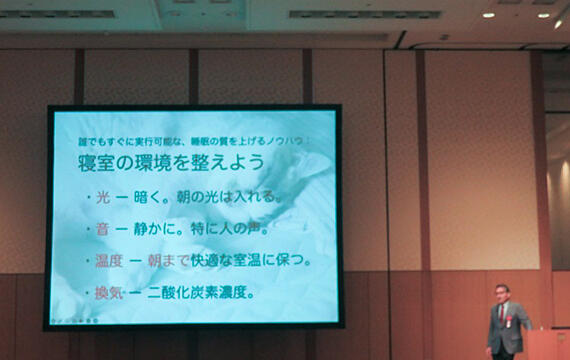
Orexin receptor antagonists that "don't become habit-forming"
In childhood we are early birds, but from adolescence into our twenties, we are night owls. Then, as we age we gradually return to being early birds, becoming morning people around age 60, and becoming super morning people in late old age. This is not due to social (factors) but biological changes. Therefore, it can be said that rousing young people, including middle and high school students, university students, and young employees, in the morning is unproductive.
After this, I'll touch on my research. About 25 to 30 years ago, I discovered a substance called "orexin" (a neuropeptide that plays an important role in controlling sleep and wakefulness). I won't discuss the process today, but I discovered it through pure biochemical methods.
Orexin is like the boss of the brain's waking system, and when its action is pharmacologically blocked, you become sleepy. This idea has already been put into practical use, with three types of drugs being used as prescription sleep medications. These are completely new types of sleep medications called orexin (receptor) antagonists. I hate to say it myself, but orexin antagonists are really good drugs. They don't give you tolerance, dependency, or have the property of making you even more unable to sleep if you suddenly stop taking them after using them for a long time. There may be people who have been using sleep medications for many years, but they have notable characteristics such as "not becoming habit-forming."
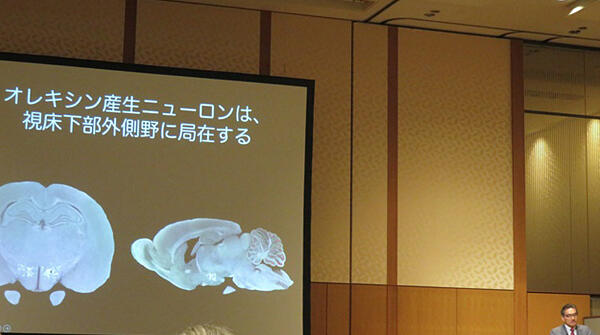
Frightening sleep apnea syndrome
Self-perceived sleep duration and quality are unreliable. In a survey of Japanese people (using objective sleep quality testing methods developed by Professor Yanagisawa and colleagues through brainwave measurement and other techniques), 45% of those who said they were getting sufficient sleep were actually sleep-deprived, while conversely, two-thirds of people complaining of insomnia were objectively sleeping well. Only one-third were truly not sleeping well. This is called "sleep misperception." This is the reality of insomnia (complaints).
Also, 40% of people who say they have no problems with their sleep are found to have sleep apnea syndrome (which is bad for sleep). Sleep apnea syndrome is overwhelmingly a male disease during youth. Female hormone action seems to be related. However, as women reach middle age and elderly years, the proportion of female sufferers increases and eventually becomes 1:1.
From a sleep science perspective, alcohol is not good—while it helps you fall asleep, it worsens sleep quality. Both deep sleep and REM sleep disappear. It also induces apnea. I also like alcohol and won't say "don't drink," but please stop drinking alcohol for the purpose of sleep or drinking it as a sleep aid substitute. From a sleep science ideal, 3 hours before bedtime, preferably 4 hours before, a small amount—"1 portion" (1 drink)—is fine.
Even people with sleep apnea syndrome can get ideal sleep when they undergo CPAP therapy (Continuous Positive Airway Pressure therapy) at night. However, if it's left untreated and it becomes severe, it's frightening. The 12-year survey showed that when severe sleep apnea syndrome was left untreated, nearly 20% (of severe patients) died from fatal cardiovascular disorders such as myocardial infarction, aortic dissection, and stroke. However, treatment can suppress this risk.
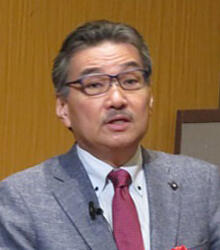
Profile
Masashi Yanagisawa
Director and Professor, International Institute for Integrative Sleep Medicine (WPI-IIIS), University of Tsukuba
Born May 25, 1960. Completed doctoral program at University of Tsukuba School of Medical and Health Sciences and Doctoral Program in Medical Sciences. Moved to the US in 1991 and headed research laboratories at University of Texas Southwestern Medical Center and Howard Hughes Medical Institute until 2014. Became University of Tsukuba professor in 2010. Has held current position since 2012. Founded University of Tsukuba venture company "S'UIMIN" in 2017. Has served as project manager for Moonshot Research and Development Program since 2021. Received Medal with Purple Ribbon, Asahi Prize, Erwin von Bälz Prize and other awards for achievements including discovery of orexin. Named Person of Cultural Merit in 2019.
(UCHIJO Yoshitaka / Science Journalist)
Original article was provided by the Science Portal and has been translated by Science Japan.




